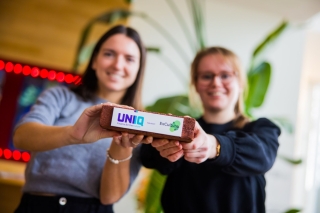Venture Challenge Spring 2023 winner Exculture has successfully secured €350,000 in financing from UNIIQ/Delft Enterprises.
ExCulture is working on the development of a fermentation process that has the potential to provide a safer way of producing heparin on a larger scale. To work on the business side of their innovation, founders Ilaria Poledri and Aisling Foley participated in the Venture Challenge (Spring 2023).
Since then a lot has happened for the Delft/Leiden startup. After winning the Venture Challenge, they became proud residents of Planet B.io at the Biotech Campus in Delft and they have now secured €350,000 funding to further develop their fermentation process for producing heparin through UNIIQ/Delft Enterprises.
Heparin is a medicine that is often used in hospital settings. It’s used as an anticoagulant/blood thinner to prevent clotting in patients with cardiovascular diseases as well as for other conditions such as hemodialysis. However, because of the unsustainable way it’s produced, it’s challenging to meet demand and keep the supply chain of heparin safe for patients.
“Heparin is a byproduct of pig slaughter,” explains Ilaria. “The intestines from the dead pigs are scraped, and heparin is extracted through a very extensive separation and purification process. However, the yield is very low, making this process inefficient. Furthermore, this process is also very unstable as heparin comes from animal tissue. It’s uncontrolled and unsafe. For example, during the swine flu epidemic, the supply couldn’t meet the demand anymore, which led to a contamination crisis that caused the death of many people. Ever since 2017, heparin has been on the US FDA drug shortage list. On top of that, the Netherlands imports the largest portion of its heparin supply from the US, which in turn imports it from China. About 80% of the US’s supply chain of heparin comes from China, which makes the Netherlands indirectly dependent on China. That poses security and geopolitical issues. That’s why we want to step in with ExCulture.”
Ilaria and co-founder Aisling Foley aim to transform the production method of this life-saving pharmaceutical. “We want to future-proof the heparin supply chain by removing the dependency on animals and high-risk countries,” says Ilaria. “Based on 30 years of research carried out at the TU Delft, we are developing a fermentation process similar to that implemented in wastewater treatment, aiming to use more environmentally friendly and abundant sources of feedstocks while maintaining sterile, controllable lab conditions. Contrary to our competitors, we’re not using a synthetic approach, we’re not using chemical synthesis, and we’re also not using bio-engineered enzymes. We’re just using the natural production method that we find in this fermentation bioprocess. The benefit is that we can easily scale up the upstream part. Now we’re trying to figure out the best method for purification of the heparin compounds, the downstream part.”
Source: tech-transfer.nl
Source: uniiq.nl
